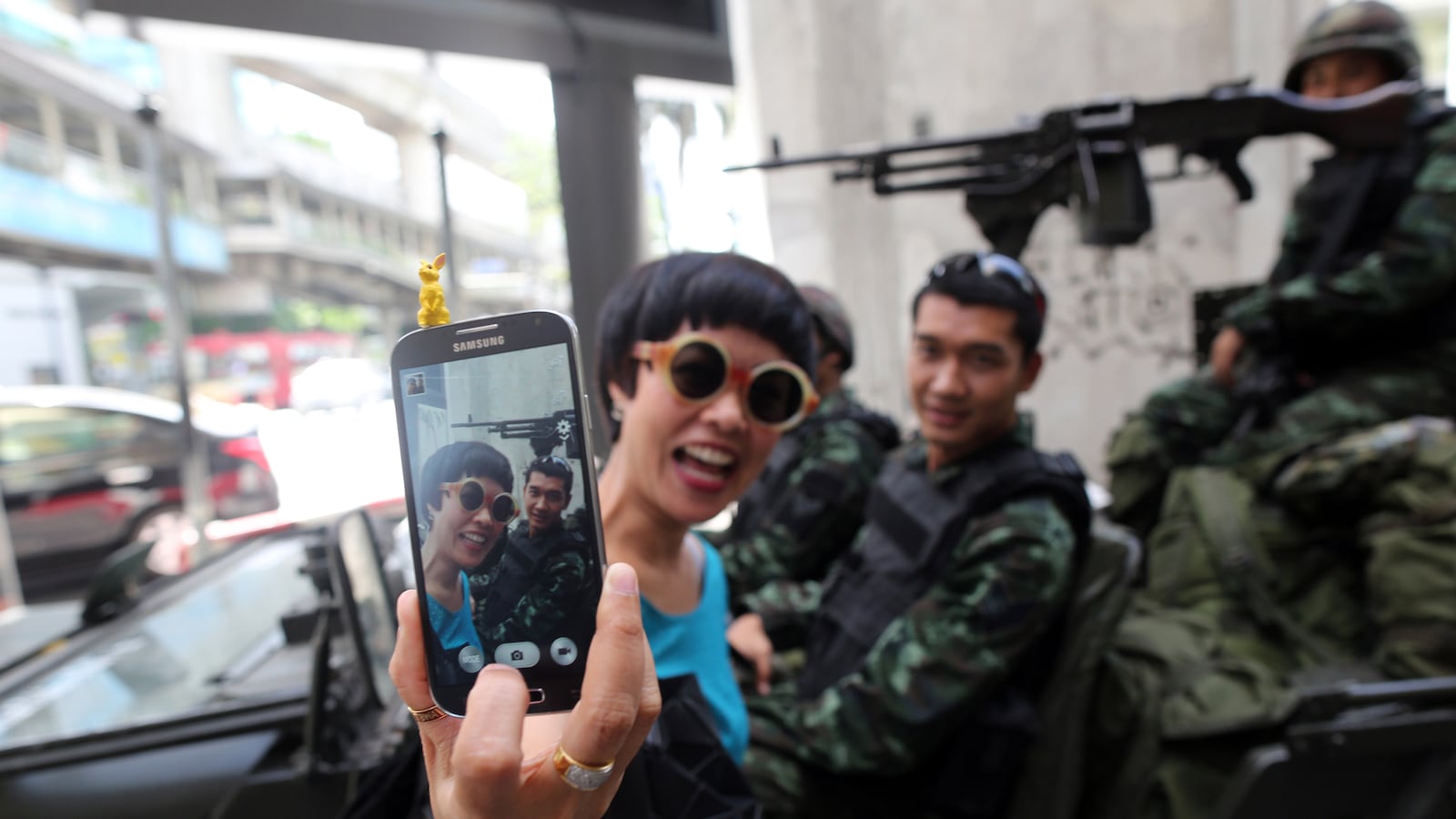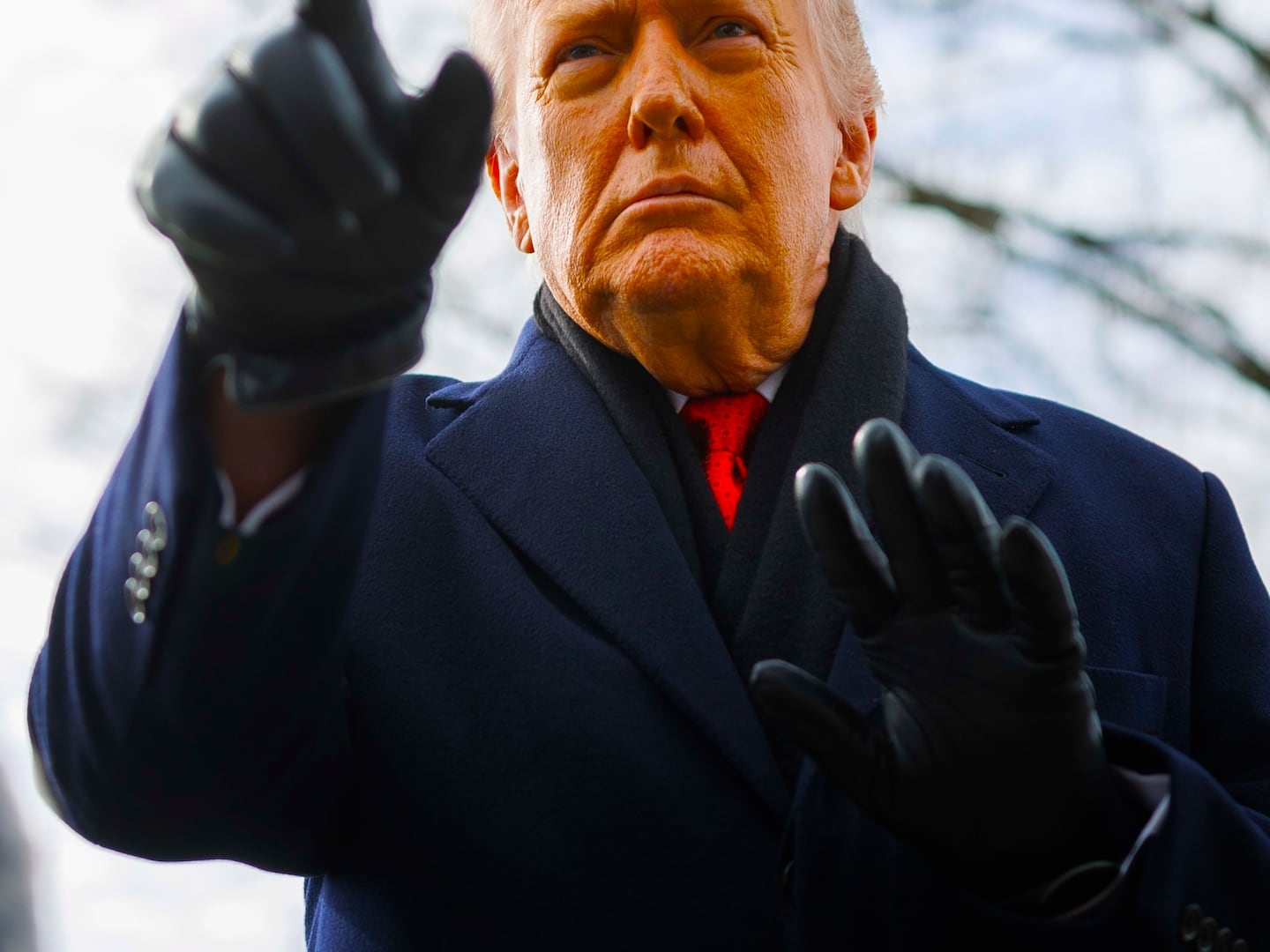BANGKOK, Thailand — The generals say they haven’t staged a coup, but critics say they’re splitting hairs. Troops are on the streets, the media is muzzled, and the already weak caretaker government has been further marginalized.

Thais who woke up a day ago to learn their nation is under martial law went about their lives Wednesday with a sangfroid characteristic of the Land of Smiles, shrugging off the armored vehicles scattered around Bangkok and even taking selfies with soldiers. But underlying the equanimity is an important issue: Is martial law just a euphemism for coup d’etat or is it not?
It’s a fair question in Thailand, which has undergone 18 coups in recent years. The generals fear that calling what they just did a new coup would provoke a domestic backlash as well as international condemnation, especially from Washington. The United States might well impose sanctions in that case. And a coup probably would exacerbate the economic problems that months of friction, violence and impasse have wrought.
Small wonder, then, that the man who made the decision, Army Gen. Prayuth Chan-ocha, is going to great lengths to insist this isn’t a coup at all, that the caretaker government remains in charge, and that he took the action—apparently without consulting caretaker Prime Minister Niwattumrong Boonsongpaisan—purely to maintain law and order and try to end the months-long civil strife that has battered the economy and reduced governance to a shambles.
“With martial law enforced, it marks step one on the path to peace, which will be quickly restored," Prayuth declared. Thailand has been gripped by gridlock and violence since protesters took to Bangkok’s streets six months ago, demanding that the Pheu Thai party government led by Prime Minister Yingluck Shinawatra resign. The protesters, calling themselves the People’s Democratic Reform Committee and led by former Democrat Party Member of Parliament Suthep Thaugsuban, charged that Yingluck was corrupt and merely a proxy for her brother Thaksin Shinawatra, who was ousted as premier in the last military coup, in 2006. Yingluck herself was evicted from Government House two weeks ago by the Constitutional Court, which found her guilty of abuse of power—for transferring a leading civil servant to a new job.
Twenty-eight people have been killed and more than 700 injured so far in the course of the protests—statistics Prayuth has seized on to help justify the imposition of martial law.
The military has been cautious in its moves: it has not abrogated the Thai constitution and has been low-key in deployment of soldiers, moving only to “secure” a number of major Bangkok intersections and government installations. No curfew has been implemented. On the other hand, the Army has clamped down on the press, silencing some television stations, and “asking” social network operators and users to censor themselves to avoid “distorted information that could cause misunderstanding.”
“Media freedom is the first victim of repression,” Sunai Phasuk, a senior researcher for Human Rights Watch said Wednesday night at the Foreign Correspondents Club of Thailand. Prayuth claims the media clampdown is a way to prevent dissemination of false and or/alarmist information and propaganda that might destabilize the country. Sunai accuses the military of “grab[bing] power with very lame justification.”
He is not alone in that view. While some polling shows a majority of ordinary Thais approve of martial law, the political class is roiled with suspicion. “I believe it is a coup. It’s a new, creative name for a Thai coup,” Sean Boonpracong, an adviser in the prime minister’s office, tells The Daily Beast. “They know that a coup will not be accepted, and they know the constitution gives them the legal right to declare martial law. Yes, the caretaker government is still there, but they dictate what the government can do.” Legal analyst Verapat Pariyawong, also speaking at the Thailand press club, put it this way: “Martial law is a double-edged sword that could be used to prevent a coup or it could be used to effect a coup.”
But “it is irresponsible to label this a coup,” says Korn Chatikavanij, a former Democrat Party MP. “Civil society will be keeping an eye on the army to make sure it doesn’t overstep.”
Akanat Promphan, a spokesman for the People’s Democratic Reform Committee, also dismissed the coup claims. “It’s not a coup. They’d have to suspend the constitution and [use force]. A coup would involve a claim of power, which the army isn’t doing.”
He pointed to a meeting Prayuth chaired Wednesday that brought together for the first time leaders of Pheu Thai, the Democrat Party, the Election Commission, the People’s Democratic Reform Committee, the United Front for Democracy Against Dictatorship (Red Shirts), the army, and others. “The army didn’t send troops to escort people to the meeting,” he said. “We were all invited.”
The hope is that the warring groups will use the breathing room provided by martial law to forge a deal that would include an interim government, new election, and much-trumpeted (but always vague) “reforms.” No agreements were reached at the Wednesday session; other meetings will be held Thursday and in the days ahead.
Insiders tell The Daily Beast that the “semi-coup” probably was agreed to beforehand by the military, the Pheu Thai caretaker government, and archrivals the PDRC and the Red Shirts. The explanation goes like this: declaring martial law was designed to prevent the Red Shirts from confronting PDRC protesters in Bangkok’s streets and to halt the disruptive protests, which some critics say have been losing public support anyway.
“In my view it’s the army trying to force a resolution. In my view it’s also a way to help the PDRC step down with the least embarrassment,” political commentator Songkran Grachangnetara tells The Daily Beast. “My prediction is, the army will force a compromise. We will end up with some sort of power sharing or interim government and elections will be an eventuality, with some reform agenda in the cards. The PDRC can claim victory as it’s been able to initiate reforms, and Thaksin can claim victory by saying he has preserved democracy and elections. In my view it’s a Chinese opera; a deal already done behind the scenes.”
Adherents of the theory that oligarchs have been orchestrating a “rolling silent judicial coup” claim that the protesters’ supposed Big Business funders have grown weary of protest leader Suthep Thaugsuban’s extremism, neverending demonstrations, and harsh rehetoric. PDRC spokesman Akanat scoffs at the idea: “People don’t understand the structure of the PDRC,” he says. “We’re a people’s movement, and funding comes from many varied sources. This is not a movement run by Big Business.”
The political crisis has caused a decline in government spending as well as public spending due to falling consumer confidence, and a decrease in tourism. Tourism is likely to take a $2.7 billion hit because of the unrest,according to some estimates, and the nation’s hotel occupancy rate has fallen to as little as 25 percent. “Many agents will not survive this low season,” Bangkok travel-company owner Franz Dobersberger tells The Daily Beast. “Many used up their savings.” He attributed the problem to trip cancellations, changed itineraries, and a big fall-off in new bookings.
One immediate benefit of martial law is that both pro- and anti-governments have placed their operations in a holding pattern, waiting to see how the military will proceed. Less encouragingly, top brass have declined to provide an end date for their action, essentially saying that martial law will remain in place until stability is restored—meaning, suggests Boonpracong, “indefinitely.”






